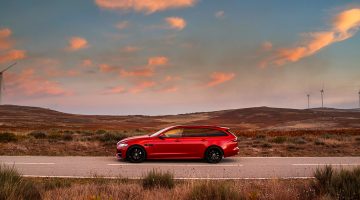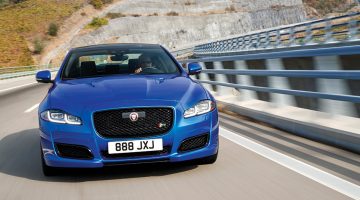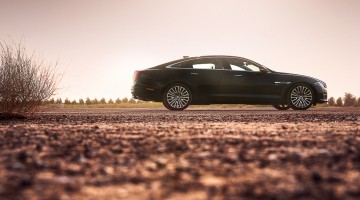If the Porsche 911 GT3 RS is NOT the main rival to the Jaguar F-TYPE SVR, what is? We find out on home turf with the 567bhp British maniac
| Engine | Power | Torque | 0-100kph | Top speed | Weight | Basic price |
|---|---|---|---|---|---|---|
| V8, supercharged, 5000c | 567bhp @ 6500rpm | 700Nm (516lb ft) @ 3500-5000rpm | 3.7secs | 322kph | 1705kg (333bhp/ton) | $157,200 |
Let me save you the tedium of ambiguity and make this simple: the Jaguar F-TYPE SVR is sensational. And the reason for that lies not just in its performance but its duality of character.
Nauseating as that marketing-heavy phrase might sound, it’s bang on. Although the fastest F-TYPE yet and developed by the same sub-division that brought us Project 7, the F-TYPE SVR is not some stripped out track weapon (we found that out on the international launch). Inside there lies not a roll cage or fire extinguisher but leather seats, a sunroof and a Meridian sound system. Yes, power over the F-TYPE R that forms the base has risen from 567bhp to 542bhp, torque doing likewise from 501lb ft to 516lb ft, but the new 3.7-second 0-100kph time and 322kph top speed are without the need of a whopping new supercharger or track-orientated performance rubber. You’ll even find that, save a tweak, the suspension architecture and chassis remain largely the same.
Less a stripped out Porsche 911 GT3 RS then, the F-TYPE SVR is more in-keeping with Mercedes’s new 577bhp AMG GT R, right down to the liver-quivering $172,300 price tag, thunderous soundtrack and intense new looks. Because, my word yes, those play a hearty hand in my enthusiasm for the F-TYPE SVR. The new aero package incorporates an active rear wing and new front splitter – plus optional carbon fibre detailed bonnet vents, fenders and mirror caps on our $194K test model – to stunning effect.
SVR vs R. What’s changed with the design?
It’s not all show and no trousers though. The newly extended front splitter for instance ensures lower drag and better airflow for improved front end response, aided by wider front and rear tyres (clad to new lighter-weight 20in alloys, just FYI). The rear wing makes the F-TYPE more aerodynamic, the four-wheel drive system remains albeit more rear-biased than before, while both the electronic steering and stability controls have been more aggressively retuned. Underneath, the chassis has been revised with new dampers and anti-roll bars, and stiffer ‘knuckles’ for further improved road holding over the base F-TYPE R. Oh, and the obligatory weight saving – helped in part by a new Inconel exhaust system and a carbon fibre roof – shaves 25kg off the R’s girth. Granted, detail tweaks to an already impressive package, the SVR does not blow the lower-spec R into the reeds, but said subtle differences though make a difference.
So, how does the SVR handle?
Really quite well. Admittedly the steering still packs that hyper-alert character we’ve come to associate with Jaguar, the slightly too-alert electronic power steering taking a little while to dial into. Once we have though, the rate of response is truly astonishing, solid weight in Sport+ mode offering immediacy and precision under turn-in, the newer, grippier front rubber making the front end somehow even more responsive and the connection between the two even more communicative.
One does wonder what a rear-wheel drive version of the SVR would be like. My guess is ‘terrifying’, given that the rear-biased four-wheel drive system still allows the rear wheels to move around quite a bit at corner exit. Fortunately the system is dialled in sufficiently, teasing the gentlest of drifts without threatening to swap ends on you altogether. Should the occasionally jumpy steering not be to your tastes, it’s unlikely to hinder your confidence, such is the tautness of the chassis and the complete lack of body roll. It’s a combination that, while not leaps and bounds over that cocktail offered by the F-TYPE R, is still more precise and alert, much like the drivetrain.
Acceleration is monstrous, there’s really no other word for it. A mighty bank of torque available from deep within the bowels of the rev band mean pick-up is as close to immediate as it’s possible to be outside a McLaren or Ferrari, the sudden explosion of momentum only slightly starting to lose its edge as the revs hit the upper echelons. The V8 will still pull of course, and comfortably so, momentum built and maintained by the eight-speed automatic transmission: it might not be as crisp as Porsche’s PDK, but there’s little to fault its swiftness. And then, there’s the soundtrack. Oh boy…
Hitherto the differences between the SVR and the R have been slight, and much is the case with the ‘harder-edged’ wail of the supercharged V8, a furore that, rather helpfully, takes the edge off more road roar at cruising speed than we’d expected. It’s the tenacity and audible violence of the exhaust notes though that truly make the hairs on the back of the neck wet themselves, a deep rumble at idle building to a higher-pitched shriek of pure adrenaline. Utterly brilliant.
Overall verdict?
The SVR then has the looks, the poise and the soundtrack of an F-TYPE R, all turned up to ‘a whole new level’. But as I mentioned earlier, it’s not just the performance that astounds. Inside, there’s a sense of refinement that, save a few additional SVR badges, has not been dented by SVO’s spannering. Yes, the tightened suspension mean the ride quality is still a bit stiff, but compared with the tighter, more cosseting confines of the AMG GT R or even Porsche’s 911, it’s a massive draw for Jaguar’s ‘everyday supercar’.
Time will ultimately tell whether the F-TYPE SVR is enough to weather the AMG GT R storm, and indeed if tweaked rather than overhauled suspension, chassis and drivetrain is truly enough to warrant that $23K premium over the already excellent F-TYPE R. For now though, as it stands, the lightest, quickest and most powerful F-TYPE on-sale today is also the best. Of that I have no doubt.
- Technical specifications available on page 2







